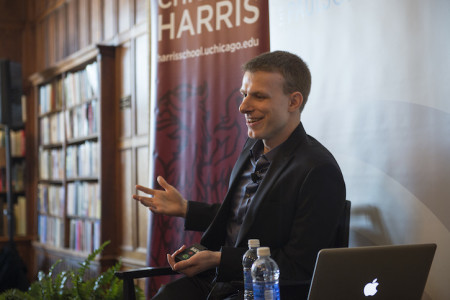When Eric Fish first moved to China to study at a Nanjing university, he watched incoming freshmen participate in mandatory military training sessions wearing full army fatigues. He was told the training was done to instill “patriotism, collectivism and revolutionary heroism.” However, Fish found that during these drills, students found ways to express their individuality, contradicting the goal of collectivism. While living in China, Fish observed how young people across China are voicing their differences, as he described in a talk at the Paulson Institute’s Contemporary China Speakers Series on the University of Chicago campus.
The new generation of young Chinese, born between 1985 and 1996, are developing new desires and demands. Unlike their parents and grandparents, many of them have not experienced extreme poverty and now desire a better quality of life. Furthermore, as the concept of the danwei—the work units that manage all aspects of a person’s —is eroded by private enterprise, the government is losing immediate control over the country’s young. These factors have resulted in a less obedient millennial generation. “Young people grow up more free and less fearful of authority,” Fish said.

As a result, the young Chinese dream is deviating from the government-approved “Chinese Dream”. The ideal Chinese Dream is to come from a good loving family, study hard, go to college, and then find a job, Fish explained. But very few entrepreneurs he spoke to actually followed this path. There was often a twist in their backgrounds that pushed them into their careers. In the words of one successful entrepreneur, who struggled in school and saw his parents divorce, “The hope of China is free thinkers, not just good students. The Chinese dream should be about many people pursuing their own dreams.”
“People are pushing for social progress in all fields, at a pace that’s maybe faster than the government would like,” said Fish, remarking that young people are becoming much bolder and willing to speak out.
However, China’s current socioeconomic condition may not be able to catch up with people’s expectations, Fish warned. More young Chinese are graduating from college, but fewer new jobs are available to them. Wealth inequality and gender imbalances also have the potential to cause problems for China’s millennials. “I don’t want to try to predict the future,” Fish concluded, “but it is going to be interesting when the young people start taking control over China.”



